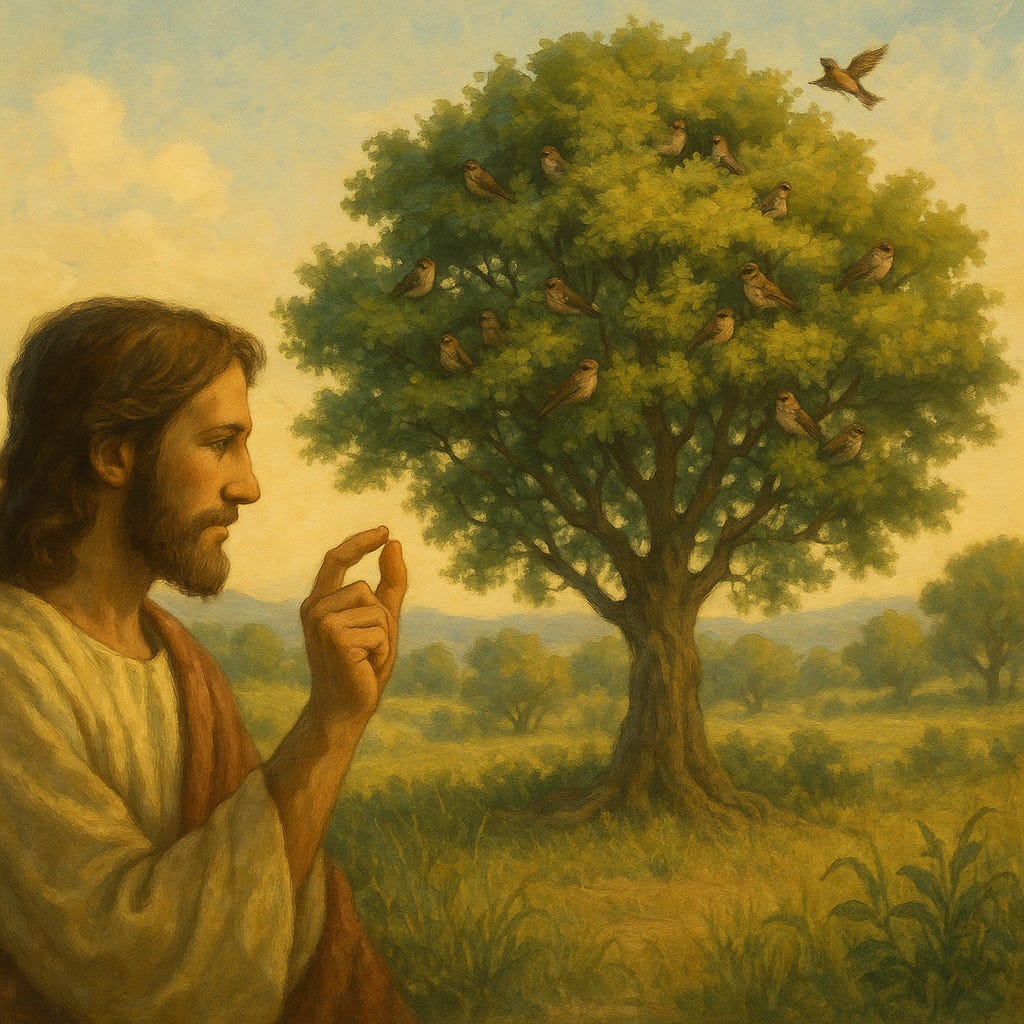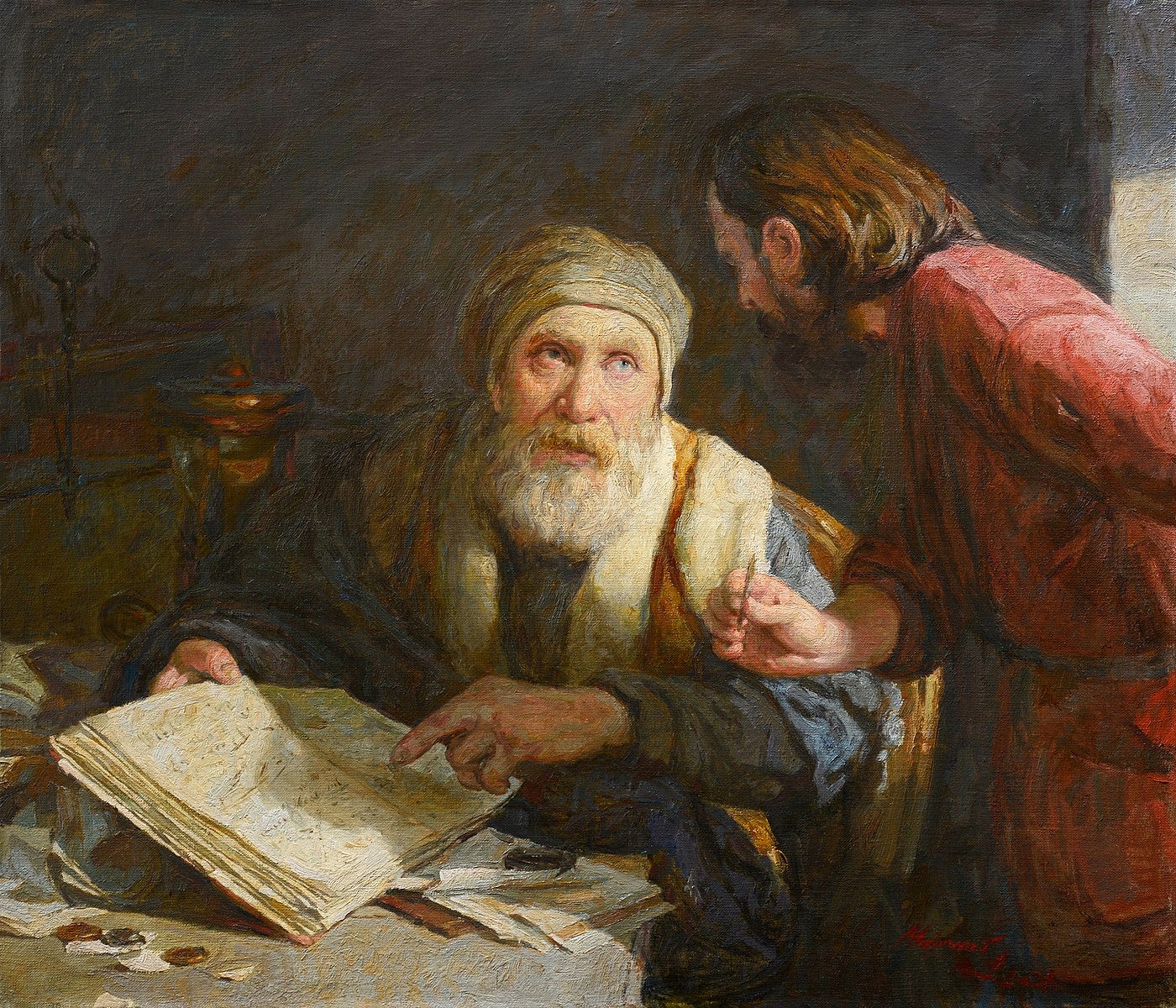Gambling on G-d’s Grace
first sermon reflection for September 21st, 2025
I’m writing two sermon reflections for this week.
Here’s the first sermon. You will find the biblical passage and my essay below.
In this missive, I’ve written a reflection on Brian Zahnd’s Parable of the Unjust Steward sermon, because the notion of unearned grace resonates with me today, as I recover from ankle surgery and navigate nerve root discomfort from a chronic lumbar disk herniation issue in my back.
Artwork :: ‘The parable of the unjust steward’ (1540) by Marinus van Reymerswaele, kept in the Kunsthistorisches Museum in Vienna.
Luke 16:1-14 :: The Parable of the Shrewd Manager
16 Jesus told his disciples: “There was a rich man whose manager was accused of wasting his possessions. 2 So he called him in and asked him, ‘What is this I hear about you? Give an account of your management, because you cannot be manager any longer.’
3 “The manager said to himself, ‘What shall I do now? My master is taking away my job. I’m not strong enough to dig, and I’m ashamed to beg— 4 I know what I’ll do so that, when I lose my job here, people will welcome me into their houses.’
5 “So he called in each one of his master’s debtors. He asked the first, ‘How much do you owe my master?’
6 “‘Nine hundred gallons of olive oil,’ he replied.
“The manager told him, ‘Take your bill, sit down quickly, and make it four hundred and fifty.’
7 “Then he asked the second, ‘And how much do you owe?’
“‘A thousand bushels of wheat,’ he replied.
“He told him, ‘Take your bill and make it eight hundred.’
8 “The master commended the dishonest manager because he had acted shrewdly. For the people of this world are more shrewd in dealing with their own kind than are the people of the light. 9 I tell you, use worldly wealth to gain friends for yourselves, so that when it is gone, you will be welcomed into eternal dwellings.
10 “Whoever can be trusted with very little can also be trusted with much, and whoever is dishonest with very little will also be dishonest with much.11 So if you have not been trustworthy in handling worldly wealth, who will trust you with true riches?12 And if you have not been trustworthy with someone else’s property, who will give you property of your own?
13 “No one can serve two masters. Either you will hate the one and love the other, or you will be devoted to the one and despise the other. You cannot serve both God and money.”
14 The Pharisees, who loved money, heard all this and were sneering at Jesus. 15 He said to them, “You are the ones who justify yourselves in the eyes of others, but God knows your hearts. What people value highly is detestable in God’s sight.
This morning Brian Zahnd preached on The Parable of the Unjust Steward. From an interpretation perspective, this parable remains one of the most challenging in Jesus’s repertoire. To fully grasp the brilliance of this parable, we must not see it as a lesson in morality or a how to be a better human story. Through the strange Parable of the Unjust Steward, Jesus teaches us about the curious nature of grace. The parable has no morality because it’s not a tale of morality, nor a lesson in how to behave. It provides a far more abstract lesson than this.
What is the kingdom of g-d like? Reader, do you remember that Jesus said, the kingdom of g-d is like a mustard seed? Jesus taught us that the kingdom of g-d lives in the hearts of humans, it doesn’t exist as an external worldly imperial kingdom. It begins small and hidden—requires transformation cultivated by grace.
The kingdom of g-d is like a mustard seed … like grain seeds sewn in the field … like a treasure hidden in a field … like a merchant looking for fine pearls … a net that was let down into the lake and caught all kinds of fish … like the owner of a house who brings out of his storeroom new treasures as well as old.1
Jesus uses many seemingly strange and yet relatable analogies to teach followers about the kingdom of g-d. Jesus uses folksy and disorienting parables to cause us to stumble and fall into the hidden and unknown world of g-d’s grace. Jesus intends us to receive his teachings with misgivings and disorientation. It’s the dark disorienting mysteries of the Son, not the obvious ease of Solomon’s proverbs.
To better understand the powerful lesson conveyed by this parable, we should remember it exists as the fourth parable in a quartet of parables that began in the previous chapter when, in response to Pharisees’ anger at Jesus for sitting with sinners who are banned from synagogue, he begins to tell the parables of the lost — Lost Coin, Lost Sheep, Lost Son. The chapter break separates the Parable of the Unjust Steward from the first three in the quartet. Make no mistake though, these parables belong together.
Pastor Zahnd notes that the Jesus told Prodigal Son and Unjust Steward parables back to back; he reveals a connection between the prodigal son and the unjust steward. Let’s consider them:
Both betray trust
Both waste the wealth of another
Both act irresponsibly with the wealth of another
One receives an unexpected party
The other unexpected commendation
Both know that salvation comes from grace or not at all
The Steward gambles on his master’s grace
The Prodigal counts on his father’s grace
The Steward preaches good news to debtors
The Prodigal, one lost and dead to his father, has returned, and lives again—he brings good news to his father.
Debtors receive the good news with joy, not knowing the Landlord fired the Steward
The father receives the good news of his son’s return.
The Landlord finds out what Steward did, as the Steward knew he would. The Landlord has a choice — revoke the good news of forgiven debt or say nothing and enjoy his new reputation as a merciful landlord. He chooses to enjoy his newfound reputation as a gracious landlord, in contrast to the older brother of the Prodigal, who chooses to retreat into the darkness, where he weeps and gnashes his teeth and refuses to join the party for his brother’s return.
The Unjust Steward gambled on the goodness of the landlord and won. With this parable, Jesus tells us an edgy and scandalous lesson in the nature of grace, not a lesson in morality.
Artwork: Parable of the Unjust Steward by A.N. Mironov, (2021)
Jesus had popularity amongst self proclaimed sinners, not Pharisees. Self proclaimed sinners know they’re flawed and need grace. Pharisees think they’re good on their merit and need no grace. Sinners know they can only get by on (unearned) mercy, that their own merit isn’t going to suffice. Reader, do you remember the enduring lesson of the New Testament? It’s that we earn salvation through grace alone and not our own merit from our own actions and deeds.
Jesus says that the sons of this age have more shrewdness than the sons of light. Meaning the sons of light aren’t that smart! Why? Well, because they’re counting on their goodness for salvation, so they’re not finding ways to received undeserved mercy.
Reader we have a choice.
Stake everything on being right and end up in the darkness weeping and gnashing our teeth
Gamble it all on the grace of g-d.
What do you choose?
Alternatively, you can support this endeavour via Buy Me A Coffee.
The Kingdom of G-d is Like, from Jesus Without Baggage, December 4, 2018






Happy Autumn Equinox. 🙂 And glad to hear that BC's and Canada's medical system came through for you. As they did for my ex's knee replacement surgery some three and a half years ago. As they did for a number of other operations and procedures since then.
Though not sure I'm entirely happy to hear about Carney's support for the State of Palestine. A two-state solution has "always" been in the cards there -- even among various Jewish politicians and spokespersons. Whether it's workable or not is a horse of an entirely different colour.